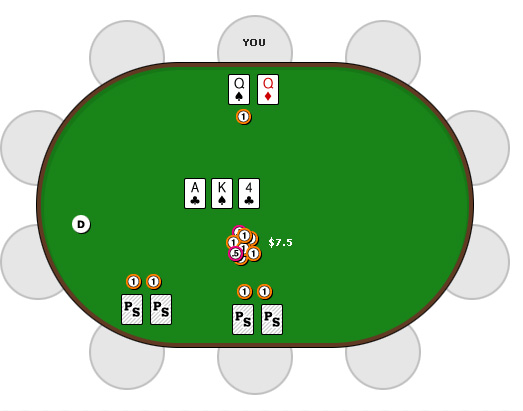Playing the Flop
Texas Hold Em is a very exciting game and a very popular one. There are four betting sequences in a Texas Hold Em game. They are:
- Pre Flop
- Post Flop
- Turn
- River
In this article we are going to talk about Post Flop play. Of course all of the betting sequences are very closely tied together. When playing chess, good players do not just think about one move at a time, they think many moves ahead into the match. Texas Hold Em is no different in this regard. In fact in the game of Texas Hold Em your moves are sometimes calculated over a period of time much greater than just one hand. For example, I played with a guy on my left that, when everyone folded to me and I called in the small blind, he would always raise me big. So over the course of the next 15 or 20 orbits, I continued calling in similar situations and laying my hand down to his raise. After a period of time the same situation happened only this time I had pocket Aces. Of course I just called and he raised me all in which was exactly what I wanted. My point is that Hold Em is a complex game and many times the things that you do will not produce a result for hours, or in some instances even days. But lets get back to Post Flop play.
Many factors affect your Post Flop play. They are:
- History
- Position
- Pre Flop action
- Size of the Pot
- Chip Stacks
- Type of game (Cash Game or Tournament)
- Your Hole cards
- The Flop
History is what we were talking about earlier. Hopefully you have been gathering information about the other players at the real money online poker usa table and can use that to influence your decisions. Position is one of the most important parts of Texas Hold Em. You will handle different hands in different ways based upon your position.
Pre Flop Action
Pre Flop action can be a major factor in Post Flop play. If the Pre Flop raiser is behind you and you have hit the flop hard, you may want to check to him because he may make a continuation bet. The size of the pot will affect your play post flop. If the pot is big it may make sense to bet out, even if you have not hit your hand, in the hopes of taking the pot down right there. If the pot is small and you have hit the flop hard, you may want to slow play your hand in the hopes of building the pot up in later rounds. Chip stacks are a factor and even more so in tournament action because in a ring game a player can always buy more chips while this is not always an option in tournament action. Checking into a big stack may induce a bet, while betting into a short stack may cause the player to fold because he is protecting his remaining chips. Type of game is a factor. As we just said, in Ring games a player can buy more chips at the end of the hand. And in tournaments when you are close to the money positions, many players will let you take down a pot rather than risk their chance of getting into the money. Your hole cards and how you hit the flop also make a difference. If you hit top pair but there are flush and/or straight draws on the board, in the absence of other determining factors, you should bet out and make it expensive for the other players in the hand to draw out on you. If you flop the nuts then you probably want to give the other players a chance to make something.
